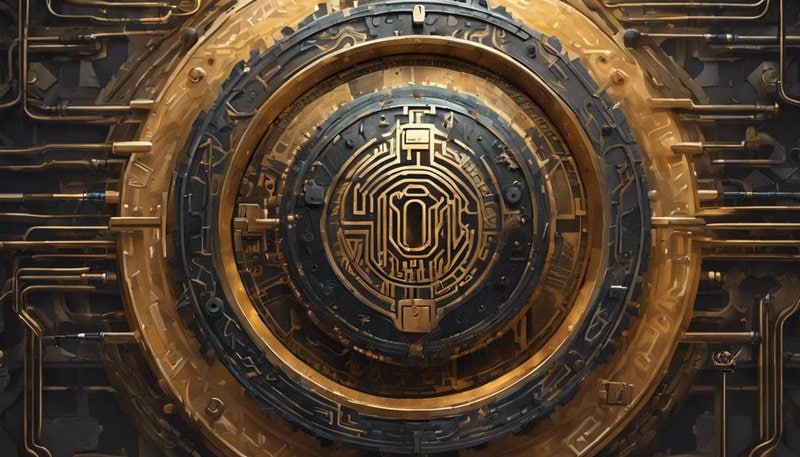What Are Smart Contracts? Automating NFT Transactions

Smart contracts are self-executing contracts with the terms of the agreement directly written into code. They automatically enforce and facilitate the performance of credible transactions.
This technology eliminates the need for intermediaries and ensures a transparent and secure process for all parties involved.
Key Takeaways
- Smart contracts automate NFT transactions for secure, transparent, and efficient dealings.
- NFT benefits include provenance analysis, ownership verification, and interoperability, enhancing reliability.
- Secure transactions via decentralized escrow, encryption, and multi-signature features ensure heightened security.
- Token standards drive NFT market adoption, liquidity, authenticity, and decentralized exchange efficiency.
Understanding Smart Contracts
Exploring the intricate workings of smart contracts unveils a realm of automated transactions governed by code. Smart contract architecture forms the backbone of this automated system, defining the rules and penalties related to the agreement it encapsulates. These digital contracts execute automatically when predetermined conditions are met, removing the need for intermediaries and ensuring trust in the transaction process. By integrating smart contracts into NFT marketplaces, a new level of efficiency and security is achieved. NFT marketplace integration allows for seamless, secure, and transparent transactions in the world of digital assets.
Understanding the essence of smart contracts empowers individuals to engage in transactions with heightened confidence. The robust nature of smart contract architecture ensures the terms of the agreement are executed precisely as defined, without the potential for human error or manipulation. Embracing this technological advancement not only enhances the efficiency of transactions but also fosters a sense of security and reliability within the digital landscape.
NFTs and Digital Ownership
Embrace the transformative power of NFTs in establishing digital ownership structures.
NFTs offer unparalleled benefits for asserting ownership rights, while smart contracts streamline the complexities of transactions with efficiency and security.
NFT Benefits for Ownership
In the realm of digital ownership, NFTs offer unparalleled benefits that empower individuals to assert their ownership with immutable certainty. When delving into the world of NFTs and digital ownership, several key advantages come to light:
- Provenance Analysis: NFTs provide a transparent record of ownership history, enabling you to trace back the origins of your digital asset effortlessly.
- Ownership Verification: With NFTs, you can verify your ownership of a digital asset securely and with indisputable proof.
- Interoperability: NFTs allow for seamless transfer of ownership across different platforms, ensuring flexibility and convenience for holders.
- Scarcity Assurance: NFTs can guarantee the scarcity of digital assets, adding tangible value to your ownership.
- Authentication: NFTs offer robust authentication mechanisms, safeguarding your digital assets from unauthorized duplication or misuse.
Smart Contracts Simplify Transactions
Navigating the realm of NFTs and digital ownership reveals how smart contracts streamline transactions with unparalleled efficiency and reliability. Transaction automation lies at the core of smart contracts, enabling seamless and secure exchanges of digital assets like NFTs.
By incorporating self-executing code into transactions, smart contracts eliminate the need for intermediaries, reducing complexity and costs. Simplified processes ensure that ownership transfers are swift, transparent, and tamper-proof, instilling trust in participants.
Smart contracts act as digital escrow agents, holding assets until predefined conditions are met, safeguarding both parties involved. Embrace the power of smart contracts to revolutionize the way NFT transactions are conducted, paving the way for a future where digital ownership is effortlessly managed.
Benefits of Automation in Transactions

Harnessing the power of automation in transactions can streamline processes, enhance efficiency, and reduce human error. When considering the benefits of automation in transactions, it's essential to recognize the profound impact it can have on the overall workflow.
Here are some key advantages to ponder:
- Enhanced Accuracy: Automation minimizes the risk of human error, ensuring that transactions are executed precisely and reliably.
- Time Savings: By automating repetitive tasks, valuable time is saved, allowing for a more efficient use of resources.
- Improved Transparency: Automated transactions provide a clear audit trail, enhancing transparency and accountability in the process.
- Cost Efficiency: Automation can lead to cost savings by reducing the need for manual intervention and streamlining operations.
- Greater Security: Automated transactions can offer heightened security measures, safeguarding sensitive data and reducing the risk of fraud.
Incorporating automation into transactions not only boosts efficiency and accuracy but also sets the stage for a more secure and transparent process.
How Smart Contracts Work
To comprehend the functioning of smart contracts, delve into their fundamental principles and mechanisms. Smart contracts, powered by blockchain technology, are self-executing agreements with the ability to automate transactions without the need for intermediaries. When programmed, these contracts automatically execute actions when predefined conditions are met, ensuring efficiency and transparency in transactions.
The benefits of automation in smart contracts are manifold. By removing the necessity for intermediaries, smart contracts reduce the risk of errors, fraud, and manipulation. Additionally, automation streamlines processes, speeds up transaction times, and minimizes costs associated with traditional contract execution.
Through the utilization of smart contracts, individuals can trust in the accuracy and security of their transactions, knowing that the terms will be enforced as programmed. Embracing the workings of smart contracts empowers users to engage in transactions with confidence, knowing that automation is working tirelessly in the background to facilitate secure and efficient exchanges.
Eliminating Intermediaries in NFT Deals

Eliminating intermediaries in NFT deals empowers direct buyer-seller interactions, fostering trust and transparency in transactions.
By enabling intermediary-free NFT transactions, smart contracts facilitate secure peer-to-peer exchanges, ensuring the integrity of the deal without the need for third-party involvement.
Embracing this shift not only streamlines the process but also enhances the autonomy and efficiency of NFT transactions in the digital marketplace.
Intermediary-Free NFT Transactions
Engage in NFT transactions without the need for intermediaries by leveraging the power of smart contracts. When you delve into intermediary-free NFT transactions, you're embracing a realm of decentralized transactions and trustless exchanges.
Here are some key aspects to consider:
- Empowerment: Take control of your NFT transactions.
- Efficiency: Streamline the process without delays.
- Transparency: Gain insight into every step of the transaction.
- Security: Shield your deals from potential risks.
- Autonomy: Make decisions independently, free from external influence.
Direct Buyer-Seller Interactions
Empower yourself in NFT transactions by directly interacting with buyers and sellers, thus eliminating the need for intermediaries and embracing a more decentralized approach. By engaging in direct buyer-seller interactions, you not only take control of your transactions but also foster trust through peer validation.
Automated transfers facilitated by smart contracts ensure swift and secure exchanges, enhancing the efficiency of your NFT dealings. Embracing this method allows for a seamless and transparent process, free from the complexities often introduced by intermediaries.
Take charge of your NFT journey by leveraging the power of direct interactions, supported by automated transfers that streamline the exchange of digital assets. This approach not only simplifies transactions but also reinforces the decentralized essence of NFT dealings.
Secure Peer-To-Peer Transactions
In the realm of NFT transactions, embracing direct peer-to-peer interactions can fortify the security and authenticity of your dealings while circumventing the presence of intermediaries. When engaging in secure peer-to-peer transactions for NFTs, consider the following:
- Decentralized Escrow Services: Utilize decentralized platforms to securely hold funds until the transaction conditions are met.
- Automated Contract Execution: Implement smart contracts to automatically execute the terms of the agreement once both parties fulfill their obligations.
- Transparency: Enjoy transparent transactions where every step is recorded on the blockchain for verification.
- Cost-Effectiveness: Save on fees that would typically go to intermediaries by engaging in direct dealings.
- Control: Retain full control over your transactions without the need for third-party involvement.
Security Features of Smart Contracts

To ensure the integrity and security of smart contracts, it's imperative to implement robust features that safeguard against potential vulnerabilities. Security features play a pivotal role in fortifying the reliability of contract execution within the realm of blockchain technology. By incorporating measures such as encryption mechanisms, multi-signature requirements, and audit trails, smart contracts can significantly reduce the risk of unauthorized access and fraudulent activities. These security protocols serve as a shield, protecting the parties involved from malicious threats and ensuring that the terms of the contract are executed as intended.
Contract execution within the blockchain ecosystem demands a meticulous approach towards securing the digital agreements that underpin transactions. Embracing security features not only enhances trust among participants but also reinforces the foundation on which smart contracts operate. As individuals navigating the complexities of digital transactions, prioritizing the integration of robust security measures is paramount to safeguarding the integrity of smart contracts and upholding the reliability of automated processes.
Token Standards for NFTs
Implementing standardized token protocols is essential for ensuring the interoperability and authenticity of Non-Fungible Tokens (NFTs) within the blockchain ecosystem. When it comes to token standards for NFTs, there are several key points to consider:
- Interoperability: Token standards enhance the ability of NFTs to interact seamlessly with various platforms and applications, promoting a more interconnected blockchain environment.
- Decentralized Exchanges: By adhering to token standards, NFTs can be traded efficiently on decentralized exchanges, fostering a more decentralized and democratic trading landscape.
- Liquidity Pools: Standardized tokens increase the participation of NFTs in liquidity pools, providing greater liquidity and flexibility for NFT holders.
- Authenticity: Following token standards ensures the authenticity and uniqueness of NFTs, safeguarding against counterfeit or fraudulent tokens.
- Market Adoption: Embracing token standards accelerates the adoption of NFTs by simplifying integration processes and promoting widespread acceptance in various industries.
Real-World Applications of Smart Contracts

Consider the diverse landscape of smart contract applications in the real world. These digital agreements are revolutionizing industries and streamlining processes.
From supply chain management to insurance claims processing and beyond, smart contracts are reshaping how businesses operate.
Industry examples showcase the tangible benefits and efficiencies that smart contracts bring to various sectors, illustrating their transformative potential in today's evolving digital economy.
Use Cases
Smart contracts have revolutionized numerous industries by streamlining processes and enhancing security in real-world applications. When exploring their use cases and potential applications, consider the following:
- Automated Transactions: Smart contracts enable automated execution of transactions, reducing the need for intermediaries.
- Supply Chain Management: They enhance transparency and traceability in supply chains, reducing errors and fraud.
- Legal Agreements: Smart contracts can automate the execution of legal agreements, ensuring compliance and reducing disputes.
- Insurance Claims: They can automate the verification and processing of insurance claims, expediting payouts.
- Tokenization: Smart contracts facilitate the tokenization of assets, allowing for easier fractional ownership.
While implementation challenges exist, these future trends showcase the vast potential of smart contracts in various sectors.
Industry Examples
In examining the practical applications of smart contracts across various industries, one immediately witnesses their transformative impact on business operations. Smart contracts have revolutionized the real estate sector by streamlining property transactions, automating escrow processes, and ensuring transparent ownership records. In the music industry, these contracts are reshaping how artists manage royalties, copyrights, and distribution rights, providing them with more control and fair compensation. Below is a table illustrating the industry examples:
| Industry | Smart Contract Application |
|---|---|
| Real Estate | Automated property transactions |
| Escrow process automation | |
| Transparent ownership records | |
| Music Industry | Royalty management |
| Copyright protection | |
| Fair distribution of rights |
Challenges in Implementing Smart Contracts
Navigating the intricate landscape of smart contract implementation presents formidable challenges that demand meticulous attention to detail and unwavering precision. In the realm of NFT transactions, these challenges manifest as technical hurdles that require adept handling. Here are some key obstacles you may encounter when implementing smart contracts:
- Security Concerns: Safeguarding smart contracts against vulnerabilities is paramount to prevent unauthorized access and potential breaches.
- Complexity in Coding: The intricacies of coding smart contracts necessitate a deep understanding of programming languages and blockchain technology.
- Scalability Issues: Ensuring that smart contracts can handle a growing volume of transactions without compromising efficiency poses a significant challenge.
- Interoperability Challenges: Integrating smart contracts with existing systems and ensuring seamless communication across different platforms can be complex.
- Legal and Regulatory Compliance: Adhering to evolving legal frameworks and regulatory requirements while implementing smart contracts adds another layer of complexity.
Addressing these challenges with foresight and expertise is crucial for successful smart contract implementation in NFT transactions.
Future Trends in NFT Transactions

Embracing the evolution of NFT transactions entails anticipating forthcoming trends with astute foresight and strategic planning. As the NFT market continues to expand, staying ahead of the curve is crucial for success. Two key areas to focus on are the evolution of NFT marketplaces and cryptocurrency integration trends.
Future Trends in NFT Transactions
| NFT Marketplaces Evolution | Cryptocurrency Integration Trends | Impact on NFT Transactions |
|---|---|---|
| Enhanced user experience through customizable storefronts | Increased use of stablecoins for NFT purchases | Streamlined transactions and reduced volatility |
| Integration of social features for community engagement | Rise of cross-chain compatibility for seamless transactions | Enhanced liquidity and accessibility for NFT assets |
| Implementation of AI for personalized recommendations | Integration of decentralized finance (DeFi) protocols | Improved security and financial efficiency |
Frequently Asked Questions
Can Smart Contracts Be Used for Transactions Outside of the NFT Space?
Yes, smart contracts have vast applications beyond NFTs. In decentralized finance, they streamline transactions and ensure transparency. In supply chain management, they enhance traceability and reduce fraud. Their potential to revolutionize various sectors is immense.
How Do Smart Contracts Verify the Authenticity of Digital Assets in NFT Transactions?
To verify digital ownership in NFT transactions, smart contracts leverage blockchain technology. They ensure authenticity by recording immutable transaction details, enabling secure and transparent ownership verification of digital assets. Trust the power of smart contracts for verification.
Are There Any Legal Implications to Consider When Using Smart Contracts for NFT Transactions?
When using smart contracts for NFT transactions, legal considerations are paramount. Ensure contract enforcement aligns with local laws. Seek legal advice to safeguard transactions. Stay vigilant to mitigate risks and protect your assets.
What Happens if There Is a Dispute in an NFT Transaction Automated by a Smart Contract?
In the event of a dispute in an NFT transaction automated by a smart contract, swift resolution is key. Prioritize smart contract audits to prevent issues. Seek clarity in contract terms and engage in fair dispute resolution processes.
How Do Smart Contracts Handle Updates or Changes to the Terms of an NFT Transaction?
To navigate updates or changes in NFT transaction terms, smart contracts shine with their adept handling of modifications. Contract flexibility built into the system allows for seamless adjustments, ensuring transactions remain secure and efficient.








